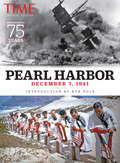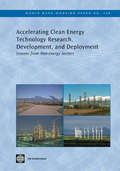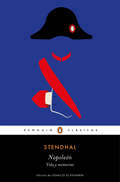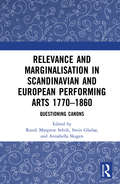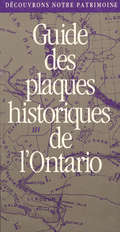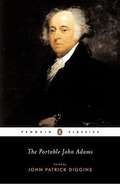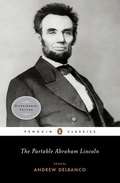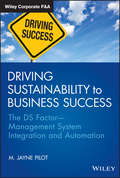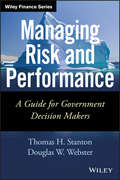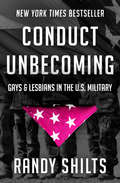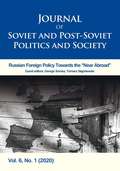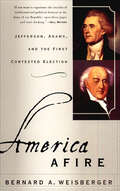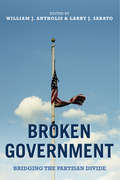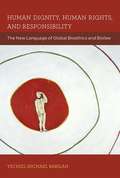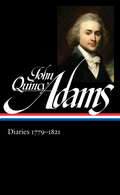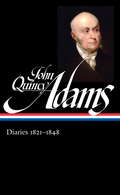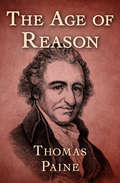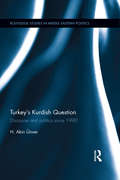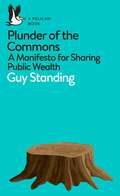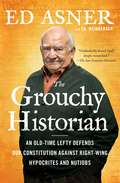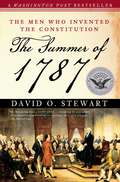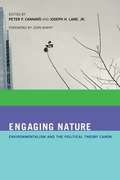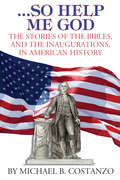- Table View
- List View
A Traveled First Lady
by Louisa Catherine Adams Margaret A. Hogan C. James TaylorCongress adjourned on 18 May 1852 for Louisa Catherine Adams's funeral, according her an honor never before offered a first lady. But her life and influence merited this extraordinary tribute. She had been first the daughter-in-law and then the wife of a president. She had assisted her husband as a diplomat at three of the major capitals of Europe. She had served as a leading hostess and significant figure in Washington for three decades. And yet, a century and a half later, she is barely remembered. A Traveled First Lady: Writings of Louisa Catherine Adams" seeks to correct that oversight by sharing Adams's remarkable experiences in her own words. These excerpts from diaries and memoirs recount her early years in London and Paris (to this day she is the only foreign-born first lady), her courtship and marriage to John Quincy Adams, her time in the lavish courts of Berlin and St. Petersburg as a diplomat's wife, and her years aiding John Quincy's political career in Washington. Emotional, critical, witty, and, in the Adams tradition, always frank, her writings draw sharp portraits of people from every station, both servants and members of the imperial court, and deliver clear, well-informed opinions about the major issues of her day. Telling the story of her own life, juxtaposed with rich descriptions of European courts, Washington political maneuvers, and the continuing Adams family drama, Louisa Catherine Adams demonstrates why she was once considered one of the preeminent women of the nineteenth century.
TIME Pearl Harbor: December 7, 1941
by Bob Dole The Editors of TIMETIME Magazine examines Pearl Harbor, 75 years later.
Accelerating Clean Energy Technology Research, Development, and Deployment
by Jonathan Coony Patrick AvatoClimate change is one of the key challenges of this century. At the same time, energy use-the primary source of climate-altering global greenhouse gas emissions-is increasing at unprecedented rates and is vital to the continued economic growth of developing countries. This poses a serious dilemma that can only be reconciled with new and improved clean energy technologies that balance climate change mitigation and increased energy needs in developing countries. Despite a recent increase in investment, public and private research, development, and deployment (RD&D) funding rates are well below historical levels. In addition, significant barriers impede the ability to develop new technologies, such as the uncertain future value of CO2 emissions, intellectual property rights issues, limited incentives to commercialize technologies for developing countries, and challenges with technology transfer. These factors must be overcome to accelerate innovation in the energy sector. To introduce new thinking to address these concerns, this report examines four cases from outside the energy sector where creative approaches to RD&D have successfully overcome similar barriers. The case studies review approaches to innovation by the Consultative Group on International Agricultural Research, Advanced Market Commitments for Vaccines, the Human Genome Project, and the concept of Distributed Innovation. These case studies show how creative efforts can generate valuable public goods via: (i) international partnerships between public and private actors, (ii) information sharing and intellectual property rights, and (iii) novel financing schemes.
Napoleón: Fragments (classic Reprint) (El\libro Aguilar Ser.)
by StendhalConmemoramos los 250 años del nacimiento de Napoleón con esta biografía escrita de la mano de un testimonio excepcional, Stendhal. «Se trata, en efecto, del hombre más grande aparecido en el mundo desde César.» Este volumen reúne los dos intentos de Stendhal de escribir la biografía de Napoleón. Durante años se dedicó a reunir el material necesario para llevar a cabo este gran proyecto pero no llegó a terminarlo. Empezó a escribir Vida de Napoleón en 1817 cuando, a pesar de que Bonaparte ya se encontraba en el exilio, Stendhal todavía creía en su empresa. En esta primera biografía se centra en sus hazañas militares y en su experiencia como combatiente en las guerras napoleónicas. En Memorias de Napoleón, escritas en 1832, desengañado por una Francia que parecía haber olvidado el canto a la libertad, se centra en el símbolo que supuso el personaje y no duda en afirmar que aborrece al tirano pero adora poéticamente su grandeza. La presente edición incluye una magnífica introducción de Ignacio Echevarría que nos acerca a la intimidad histórica con la que Stendhal dibuja el retrato de Napoleón. El texto ha sido vertido al español por Consuelo Bergés, reconocida experta en Stendhal y traductora de la obra completa.
Relevance and Marginalisation in Scandinavian and European Performing Arts 1770–1860: Questioning Canons
by Randi Margrete SelvikRelevance and Marginalisation in Scandinavian and European Performing Arts 1770–1860: Questioning Canons reveals how various cultural processes have influenced what has been included, and what has been marginalised from canons of European music, dance, and theatre around the turn of the nineteenth century and the following decades. This collection of essays includes discussion of the piano repertory for young ladies in England; canonisation of the French minuet; marginalisation of the popular German dramatist Kotzebue from the dramatic canon; dance repertory and social life in Christiania (Oslo); informal cultural activities in Trondheim; repertory of Norwegian musical clocks; female itinerant performers in the Nordic sphere; preconditions, dissemination, and popularity of equestrian drama; marginalisation and amateur staging of a Singspiel by the renowned Danish playwright Oehlenschläger, also with perspectives on the music and its composers; and the perceived relevance of Henrik Ibsen’s staged theatre repertory and early dramas. By questioning established notions about canon, marginalisation, and relevance within the performing arts in the period 1770–1860, this book asserts itself as an intriguing text both to the culturally interested public and to scholars and students of musicology, dance research, and theatre studies.
Découvrons Notre Patrimoine: Guide des plaques historiques de l'Ontario
by Mary Ellen Perkins Nicole AndreDepuis que le programme de commémoration historique a été inauguré par le gouvernement de l’Ontario en 1956, plus de 1 000 plaques ont été érigées d’un bout à l’autre de la province. La variété des sujets commémorés est étonnante, qu’il s’agisse de ruées vers les mines du nord de l’Ontario ou de l’invention de la vis à tête creuse … de Harold Innis ou de Stephen Leacock … de l’épidemie de typhus de 1847 ou de la découverte de l’insuline. La culture populaire est également bien représentée: "Beautiful Joe" commémore un roman célêbre dans le monde entier racontant l’histoire d’un chien ; "When You and I Were Young, Maggie" chante une ballade romantique très en vogue ; "Jumbo" marque l’emplacement où est mort un éléphant de cirque très aimé. L’histoire de l’Ontario, tout comme sa géographie et ses habitants, est vaste et variée. Ce guide peut donc être utile, que l’on circule sur l’autoroute, se promène a la campagne ou flâne dans son propre quartier. Il reste encore tant à découvrir.
The Portable John Adams
by John Adams Jack DigginsIn addition to being an uncompromising defender of liberty, esteemed diplomat, and successor to George Washington, John Adams was a passionate and prolific writer. Adams biographer John Patrick Diggins gathers an impressive variety of his works in this compact, original volume, including parts of his diary and autobiography, and selections from his rich correspondence with this wife, Abigail, Thomas Jefferson, and others. The Portable John Adams also features his most important political works: "A Dissertation on Canon and Feudal Law," "Thoughts on Government," "A Defense of Constitutions," "Novanglus," and "Discources in Davila." There is no finer introduction to the protean genius of this seminal American philosopher. First time in Penguin Classics
The Portable Abraham Lincoln
by Abraham LincolnCelebrate the bicentennial of Abraham Lincoln's birth with this new edition of his greatest speeches and writings Abraham Lincoln endowed the American language with a vigor and moral energy that has all but disappeared from today's public rhetoric. Lincoln's writings are testaments of our history, windows into his enigmatic personality, and resonant examples of the writer's art. The Portable Abraham Lincoln contains the great public speeches-the first debate with Stephen Douglas, the "House Divided"speech, the Gettysburg Address, the Second Inaugural Address-along with less familiar letters and memoranda that chart Lincoln's political career, his evolving stand against slavery, and his day-to-day conduct of the Civil War. This edition includes a revised introduction, updated notes on the text, a chronology of Lincoln's life, and four new selections of his writing. .
Driving Sustainability to Business Success
by M. Jayne PilotEfficient, compliant management systems pave the road to sustainability through integration and automationThe book addresses the many definitions of sustainability and why CEOs need the links between sustainability, business value, and performance. Business leaders are committed to leading the way, and the book outlines the support of a management system structure and business principles that will drive the accomplishment of their mission. Stakeholder demands on CEOs include many challenges. Investors are assessing companies for financial performance. The shrinking talent pool of employees is looking to work with organizations that support social, environment, and economic operating practices and principles.Great leaders are those that ask questions, who are creative to drive innovation for growth of their company. The Assess-Reflect-Act section on international business principles defined in the book will ask you as the leader thought provoking questions to stimulate action within your organization to bring people, processes, and technology together for business success.Leaders need to transition to smart decisions that are data driven. The company's management system structure is important to build a strong framework for business process operations and automation for global competitiveness. Topics include:Business plans vs management systemsManagement system frameworks: standardization, ISO standards: Quality -- ISO 9001, Environment -- ISO 14001, OHSAS 18001, Integrated Management SystemsThree Steps for Process Development: Identify, Insure, ImproveFocus for the Organization: Compliance Costs, Best Practices, Strategic PlanningSupport -- Resources: Innovation, Engagement, Succession PlanningData as a Valuable ResourceOperation: Process Risks, Management System Control Plan, E-commerce, Enterprise Resource Planning (ERP), Green Awareness-Eco Design, Automated Controls, Cloud ComputingPerformance Evaluation -- Monitor, Measure, Analyze, Audit, Management ReviewCompetitive LandscapeThe constant need to improve internal processes and move toward business sustainability and quality standards is a major stressor for governments and businesses. With one-third of the workforce retiring in the next five to ten years, the need has become more immediate, and the focus has shifted to building a strong framework for business process operations and automation for global competitiveness. This book provides a roadmap to efficient, compliant systems, showing businesses how to build toward sustainability goals and capture key knowledge of the employees involved in the process.
Managing Risk and Performance
by Thomas Stanton Douglas W. WebsterDiscover analytical tools and practices to help improve the quality of risk management in government organizationsFederal agencies increasingly recognize the importance of active risk management to help ensure that they can carry out their missions. High impact events, once thought to occur only rarely, now occur with surprising frequency. Managing Risk in Government Agencies and Programs provides insight into the increasingly critical role of effective risk management, while offering analytical tools and promising practices that can help improve the quality of risk management in government organizations.Includes chapters that contribute to the knowledge of government executives and managers who want to establish or implement risk management, and especially Enterprise Risk Management (ERM), in their agenciesFeatures chapters written by federal risk managers, public administration practitioners, and scholarsShowing government officials how to improve their organization's risk management capabilities, Managing Risk in Government Agencies and Programs meets a growing demand from federal departments and agencies that find themselves increasingly embarrassed by risky events that raise questions about their ability to carry out their missions.
Conduct Unbecoming: Gays & Lesbians in the U.S. Military
by Randy Shilts&“A thoroughly researched and engrossingly readable history&” of gay men and women in the American armed forces by the author of And the Band Played On (The New York Times Book Review). Published during the same year the American military instituted Don&’t Ask, Don&’t Tell, and eighteen years before President Barack Obama repealed it, Conduct Unbecoming is a landmark work of social justice and a searing indictment of the military establishment&’s historic bigotry toward its gay servicemen and women. Randy Shilts&’s eye-opening book describes the bravery, both exceptional and everyday, not only of gay soldiers throughout history, but also of gay men and women serving in our modern military. With each anecdote and investigation, Shilts systematically dismantles the arguments against allowing gays to serve in the military. At once a history of the American military and an account of the gay rights movement, Conduct Unbecoming is a remarkable testament to the progress achieved for gays in the military—and a revealing look at how far we have yet to go.
Journal of Soviet and Post-Soviet Politics and Society Volume 6, No. 1 (2020): Volume 6, No. 1 (2020)
by Fedor Julie Makarychev Andrey Umland Andreas Dimova GerganaThis special section deals with Russia’s post-Maidan foreign policy towards the so-called “near abroad,” or the former Soviet states. This is an important and timely topic, as Russia’s policy perspectives have changed dramatically since 2013/2014, as have those of its neighbors. The Kremlin today is paradoxically following an aggressive “realist” agenda that seeks to clearly delineate its sphere of influence in Europe and Eurasia while simultaneously attempting to promote “soft-power” and a historical-civilizational justification for its recent actions in Ukraine (and elsewhere). The result is an often perplexing amalgam of policy positions that are difficult to disentangle. The contributors to this special issue are all regional specialists based either in Europe or the United States.
America Afire: Jefferson, Adams, and the First Contested Election
by Bernard A. WeisbergerAmerica Afire is the powerful story of the election of 1800, arguably the most important election in America's history and certainly one of the most hotly disputed. Former allies Adams and Jefferson, president versus vice president, Federalist versus Republican, squared off in a vicious contest that resulted in broken friendships, scandals, riots, slander, and jailings in the fourth presidential election under the Constitution.
Broken Government: Bridging the Partisan Divide (Miller Center Studies on the Presidency)
by William J. Antholis Carolyn Dewar Tom Dohrmann Andrew Erdmann Gary W. Gallagher Ryan Harper Bruce J. Katz Kyle Kondik Kunal Modi Larry J. Sabato Alan TaylorIn an increasingly polarized political environment, the first year of the new president’s term will be especially challenging. With a fresh mandate, however, the first year also offers opportunities that may never come again. The First Year Project is a fascinating initiative by the Miller Center of the University of Virginia that brings together top scholars on the American presidency and experienced officials to explore the first twelve months of past administrations, and draw practical lessons from that history, as we inaugurate a new president in January 2017.This project is the basis for a new series of digital shorts published as Miller Center Studies on the Presidency. Presented as specially priced collections published exclusively in an ebook format, these timely examinations recognize the experiences of past presidents as an invaluable resource that can edify and instruct the incoming president.Contributors: Alan Taylor, University of Virginia * Gary Gallagher, University of Virginia * Bruce Katz, Brookings Institution * Kyle Kondik, UVA Center for Politics * Carolyn Dewar, Tom Dohrmann, Andrew Erdmann, Ryan Harper, and Junal Modi, McKinsey & Company
Human Dignity, Human Rights, and Responsibility
by Yechiel Michael Barilan"Human dignity" has been enshrined in international agreements and national constitutions as a fundamental human right. The World Medical Association calls on physicians to respect human dignity and to discharge their duties with dignity. And yet human dignity is a term--like love, hope, and justice--that is intuitively grasped but never clearly defined. Some ethicists and bioethicists dismiss it; other thinkers point to its use in the service of particular ideologies. In this book, Michael Barilan offers an urgently needed, nonideological, and thorough conceptual clarification of human dignity and human rights, relating these ideas to current issues in ethics, law, and bioethics. Combining social history, history of ideas, moral theology, applied ethics, and political theory, Barilan tells the story of human dignity as a background moral ethos to human rights. After setting the problem in its scholarly context, he offers a hermeneutics of the formative texts on Imago Dei; provides a philosophical explication of the value of human dignity and of vulnerability; presents a comprehensive theory of human rights from a natural, humanist perspective; explores issues of moral status; and examines the value of responsibility as a link between virtue ethics and human dignity and rights. Barilan accompanies his theoretical claim with numerous practical illustrations, linking his theory to such issues in bioethics as end-of-life care, cloning, abortion, torture, treatment of the mentally incapacitated, the right to health care, the human organ market, disability and notions of difference, and privacy, highlighting many relevant legal aspects in constitutional and humanitarian law.
John Quincy Adams: Diaries 1779-1821
by David Waldstreicher John Quincy AdamsFor the 250th anniversary of John Quincy Adams's birth, a landmark new edition of an American masterpiece: the incomparable self-portrait of a man and his times from the Revolution to the coming of the Civil War.The diary of John Quincy Adams is one of the most extraordinary works in American literature. Begun in 1779 at the age of twelve and kept more or less faithfully until his death almost 70 years later, it is both an unrivaled record of historical events and personalities from the nation's founding to the antebellum era and a masterpiece of American self-portraiture, tracing the spiritual, literary,and scientific interests of an exceptionally lively mind. Now, for the 250th anniversary of Adams's birth, Library of America and historian David Waldstreicher present a two-volume reader's edition based for the first time on the original manuscript diaries, restoring personal and revealing passages suppressed in earlier editions.Volume I begins during the American Revolution, with Adams's first entry, as he prepares to embark on a perilous wartime voyage to Europe with his father, diplomat John Adams, and records his early impressions of Franklin and Jefferson and of Paris on the eve of revolution; it details his abbreviated but eventful years of study at Harvard and his emergence into the world of politics in his own right, as American minister to the Netherlands and to Prussia, and then as a U. S. senator from Massachusetts; and it reveals a young man at war with his passions, before finding love with the remarkable Louisa Catherine Johnson. In passages that form a kind of real-world War and Peace, the diary follows the young married couple to St. Petersburg, where as U.S. minister Adams is a witness to Napoleon's invasion of Russia. Its account of the negotiations at Ghent to end the War of 1812, where Adams leads the American delegation, is the perhaps the most detailed and dramatic picture of a diplomatic confrontation ever recorded. Volume 1 concludes with his elevation as Secretary of State under James Monroe, as he takes the fore in a fractious cabinet and emerges as the principal architect of what will become known as the Monroe Doctrine.
John Quincy Adams: Diaries 1821-1848
by David Waldstreicher John Quincy AdamsFor the 250th anniversary of John Quincy Adams's birth, a landmark new edition of an American masterpiece: the incomparable self-portrait of a man and his times from the Revolution to the coming of the Civil War.The diary of John Quincy Adams is one of the most extraordinary works in American literature. Begun in 1779 at the age of twelve and kept more or less faithfully until his death almost 70 years later, it is both an unrivaled record of historical events and personalities from the nation's founding to the antebellum era and a masterpiece of American self-portraiture, tracing the spiritual, literary,and scientific interests of an exceptionally lively mind. Now, for the 250th anniversary of Adams's birth, Library of America and historian David Waldstreicher present a two-volume reader's edition based for the first time on the original manuscript diaries, restoring personal and revealing passages suppressed in earlier editions.Volume 2 opens with Adams serving as Secretary of State, amid political maneuverings within and outside James Monroe's cabinet to become his successor, a process that culminates in Adams's election to the presidency by the House of Representatives after the deadlocked four-way contest of 1824. Even as Adams takes the oath of office, rivals Henry Clay, his Secretary of State, John C. Calhoun, his vice president, and an embittered Andrew Jackson, eye the election of 1828. The diary records in candid detail his frustration as his far-sighted agenda for national improvement founders on the rocks of internecine political factionalism, conflict that results in his becoming only the second president, with his father, to fail to secure reelection. After a short-lived retirement, Adams returns to public service as a Congressman from Massachusetts, and for the last seventeen years of his life he leads efforts to resist the extension of slavery and to end the notorious "gag rule" that stifles debate on the issue in Congress. In 1841 he further burnishes his reputation as a scourge of the Slave Power by successfully defending African mutineers of the slave ship Amistad before the Supreme Court. The diary achieves perhaps its greatest force in its prescient anticipation of the Civil War and Emancipation, an "object," as Adams described it during the Missouri Crisis, "vast in its compass, awful in its prospects, sublime and beautiful in its issue."
The Age of Reason: Being An Investigation Of True And Fabulous Theology - Primary Source Edition
by Thomas PaineThe author of Rights of Man and Common Sense argues for belief in God without religion.My own mind is my own church. In The Age of Reason, political activist and Founding Father Thomas Paine makes a powerful case for a rational approach to theology. In keeping with the intellectual tradition of British Deism, Paine rejects the notion of divine revelation, saying “it is revelation to the first person only, and hearsay to every other.” He proceeds with a detailed analysis of the Bible’s inconsistencies and historical inaccuracies to conclude that it cannot be a divinely inspired text. Arguing against all forms of organized religion, he declares nature itself to be the only true testament to the existence of a divine creator. Originally published in three parts, in 1794, 1795, and 1807, The Age of Reason was a major influence on the freethinker movement in the United States. In Britain, however, it was declared seditious and led to the arrest of those who dared to print and distribute it. This ebook has been professionally proofread to ensure accuracy and readability on all devices.
Turkey's Kurdish Question: Discourse & Politics Since 1990 (Routledge Studies in Middle Eastern Politics)
by Hamid Akin UnverThe Kurdish question is one of the most complicated and protracted conflicts of the Middle East and will never be resolved unless it is finally defined. The majority of the Kurdish people live in Turkey, which gives the country a unique position in the larger Kurdish conundrum. Society in Turkey is deeply divided over the definition and even existence of the Kurdish question, and this uncertainty has long manifested itself in its complete denial, or in accusations of political rivals of ‘separatism’ and even ‘treason’. Turkey’s Kurdish Question explores how these denial and acknowledgement dynamics often reveal pre-existing political ideology and agenda priorities, themselves becoming political actions. While the very term "Kurdish question" is discussed in the academic literature as a given, a new and systemic study is required to deconstruct and analyze the constitutive parts of this discursive construct. This book provides the first comprehensive study and analysis of the discursive constructions and perceptions of what is broadly defined as the "Kurdish question" in Turkish, European and American political cultures. Furthermore, its new methodological approach to the study of discourse and politics of secessionist conflicts can be applied to many similar intra-state conflict cases. Turkey’s Kurdish Question would suit students and scholars of Middle East studies, Conflict studies and Comparative Politics, as well as Turkish or Kurdish studies. H. Akın Ünver is an assistant professor of international relations at Kadir Has University. This book is based on his dissertation ‘Defining Turkey’s Kurdish Question‘, which has won the Middle East Studies Association (MESA) 2010 Malcolm H. Kerr award for the best dissertation in the field of social sciences.
Plunder of the Commons: A Manifesto for Sharing Public Wealth (Pelican Books)
by Guy Standing'One of the most important books I've read in years' Brian EnoWe are losing the commons. Austerity and neoliberal policies have depleted our shared wealth; our national utilities have been sold off to foreign conglomerates, social housing is almost non-existent, our parks are cordoned off for private events and our national art galleries are sponsored by banks and oil companies. This plunder deprives us all of our common rights, recognized as far back as the Magna Carta and the Charter of the Forest of 1217, to share fairly and equitably in our public wealth.Guy Standing leads us through a new appraisal of the commons, stemming from the medieval concept of common land reserved in ancient law from marauding barons, to his modern reappraisal of the resources we all hold in common - a brilliant new synthesis that crystallises quite how much public wealth has been redirected to the 1% in recent decades through the state-approved exploitation of everything from our land to our state housing, health and benefit systems, to our justice system, schools, newspapers and even the air we breathe. Plunder of the Commons proposes a charter for a new form of commoning, of remembering, guarding and sharing that which belongs to us all, to slash inequality and soothe our current political instability.
The Grouchy Historian: An Old-Time Lefty Defends Our Constitution Against Right-Wing Hypocrites and Nutjobs
by Ed Asner Ed. WeinbergerIn the tradition of Al Franken and Michael Moore, Ed Asner—a.k.a. Lou Grant from The Mary Tyler Moore Show—reclaims the Constitution from the right-wingers who think that they and only they know how to interpret it.Ed Asner, a self-proclaimed dauntless Democrat from the old days, figured that if the right-wing wackos are wrong about voter fraud, Obama’s death panels, and climate change, they are probably just as wrong about what the Constitution says. There’s no way that two hundred-plus years later, the right-wing ideologues know how to interpret the Constitution. On their way home from Philadelphia the people who wrote it couldn’t agree on what it meant. What was the president’s job? Who knew? All they knew was that the president was going to be George Washington and as long as he was in charge, that was good enough. When Hamilton wanted to start a national bank, Madison told him that it was unconstitutional. Both men had been in the room when the Constitution was written. And now today there are politicians and judges who claim that they know the original meaning of the Constitution. Are you kidding? In The Grouchy Historian, Ed Asner leads the charge for liberals to reclaim the Constitution from the right-wingers who use it as their justification for doing whatever terrible thing they want to do, which is usually to comfort the comfortable and afflict the afflicted. It’s about time someone gave them hell and explained that progressives can read, too.
The Summer of 1787
by David O. StewartThe Summer of 1787 takes us into the sweltering room in which the founding fathers struggled for four months to produce the Constitution: the flawed but enduring document that would define the nation--then and now.George Washington presided, James Madison kept the notes, Benjamin Franklin offered wisdom and humor at crucial times. The Summer of 1787 traces the struggles within the Philadelphia Convention as the delegates hammered out the charter for the world's first constitutional democracy. Relying on the words of the delegates themselves to explore the Convention's sharp conflicts and hard bargaining, David O. Stewart lays out the passions and contradictions of the, often, painful process of writing the Constitution. It was a desperate balancing act. Revolutionary principles required that the people have power, but could the people be trusted? Would a stronger central government leave room for the states? Would the small states accept a Congress in which seats were allotted according to population rather than to each sovereign state? And what of slavery? The supercharged debates over America's original sin led to the most creative and most disappointing political deals of the Convention. The room was crowded with colorful and passionate characters, some known--Alexander Hamilton, Gouverneur Morris, Edmund Randolph--and others largely forgotten. At different points during that sultry summer, more than half of the delegates threatened to walk out, and some actually did, but Washington's quiet leadership and the delegates' inspired compromises held the Convention together. In a country continually arguing over the document's original intent, it is fascinating to watch these powerful characters struggle toward consensus--often reluctantly--to write a flawed but living and breathing document that could evolve with the nation.
The Summer of 1787
by David O. StewartThe successful creation of the Constitution is a suspense story. The Summer of 1787 takes us into the sweltering room in which delegates struggled for four months to produce the flawed but enduring document that would define the nation -- then and now. George Washington presided, James Madison kept the notes, Benjamin Franklin offered wisdom and humor at crucial times. The Summer of 1787 traces the struggles within the Philadelphia Convention as the delegates hammered out the charter for the world's first constitutional democracy. Relying on the words of the delegates themselves to explore the Convention's sharp conflicts and hard bargaining, David O. Stewart lays out the passions and contradictions of the often painful process of writing the Constitution. It was a desperate balancing act. Revolutionary principles required that the people have power, but could the people be trusted? Would a stronger central government leave room for the states? Would the small states accept a Congress in which seats were alloted according to population rather than to each sovereign state? And what of slavery? The supercharged debates over America's original sin led to the most creative and most disappointing political deals of the Convention. The room was crowded with colorful and passionate characters, some known -- Alexander Hamilton, Gouverneur Morris, Edmund Randolph -- and others largely forgotten. At different points during that sultry summer, more than half of the delegates threatened to walk out, and some actually did, but Washington's quiet leadership and the delegates' inspired compromises held the Convention together. In a country continually arguing over the document's original intent, it is fascinating to watch these powerful characters struggle toward consensus -- often reluctantly -- to write a flawed but living and breathing document that could evolve with the nation.
Engaging Nature
by Peter F. Cannavò John Barry Joseph H. Lane Jr.Contemporary environmental political theory considers the implications of the environmental crisis for such political concepts as rights, citizenship, justice, democracy, the state, race, class, and gender. As the field has matured, scholars have begun to explore connections between Green Theory and such canonical political thinkers as Plato, Machiavelli, Locke, and Marx. The essays in this volume put important figures from the political theory canon in dialogue with current environmental political theory. It is the first comprehensive volume to bring the insights of Green Theory to bear in reinterpreting these canonical theorists.Individual essays cover such classical figures in Western thought as Aristotle, Hume, Rousseau, Mill, and Burke, but they also depart from the traditional canon to consider Mary Wollstonecraft, W. E. B. Du Bois, Hannah Arendt, and Confucius. Engaging and accessible, the essays also offer original and innovative interpretations that often challenge standard readings of these thinkers. In examining and explicating how these great thinkers of the past viewed the natural world and our relationship with nature, the essays also illuminate our current environmental predicament.Essays onPlato Aristotle Niccolò Machiavelli Thomas Hobbes John Locke David Hume Jean-Jacques Rousseau Edmund Burke Mary Wollstonecraft John Stuart Mill Karl Marx W. E. B. Du Bois Martin Heidegger Hannah Arendt Confucius ContributorsSheryl D. Breen, W. Scott Cameron, Peter F. Cannavò, Joel Jay Kassiola, Joseph H. Lane Jr. Timothy W. Luke, John M. Meyer, Özgüç Orhan, Barbara K. Seeber, Francisco Seijo, Kimberly K. Smith, Piers H. G. Stephens, Zev Trachtenberg, Andrew Valls, Harlan Wilson
…So Help Me God: The Stories of the Bibles, and the Inaugurations, in American History
by Michael B. CostanzoThe author tells the ultimate story of the use of the Bible in the United States with a brief glance back to its first use by Charlemagne in 800 then quickly moves to the beginning of constitutional government in the United States. He tells of the inaugurations beginning with George Washington in New York in 1791 when he placed his hand on a Bible loaned by a nearby Masonic lodge. Following Washington's inauguration, the author tells the story of each Bible, where it came from, how it was secured and where it is now. The story of each inauguration is also told showing the remarkable trajectory of growth in presidential celebrations and the American culture. Presidential inaugurations in other governments, on what is now U.S. soil such as the Republic of Texas, the Confederate States of America and the Republic of Hawaii, are also told. As a prelude to the stories, the author brings into focus the various editions and printings of the Bible to meet the satisfactory demands of different perspectives. It is a complete look at the use of the Book in United States Officialdom. Since George Washington used one in his 1789 inauguration, the Bible has become an indelible part of almost every American presidential inauguration. This book is a history of known Bibles used in every American presidential inauguration. It covers the United States, as well as other governments which had one time or another occupied territories now part of the United States, such as the Confederate States of America, and the Republic of Texas.

